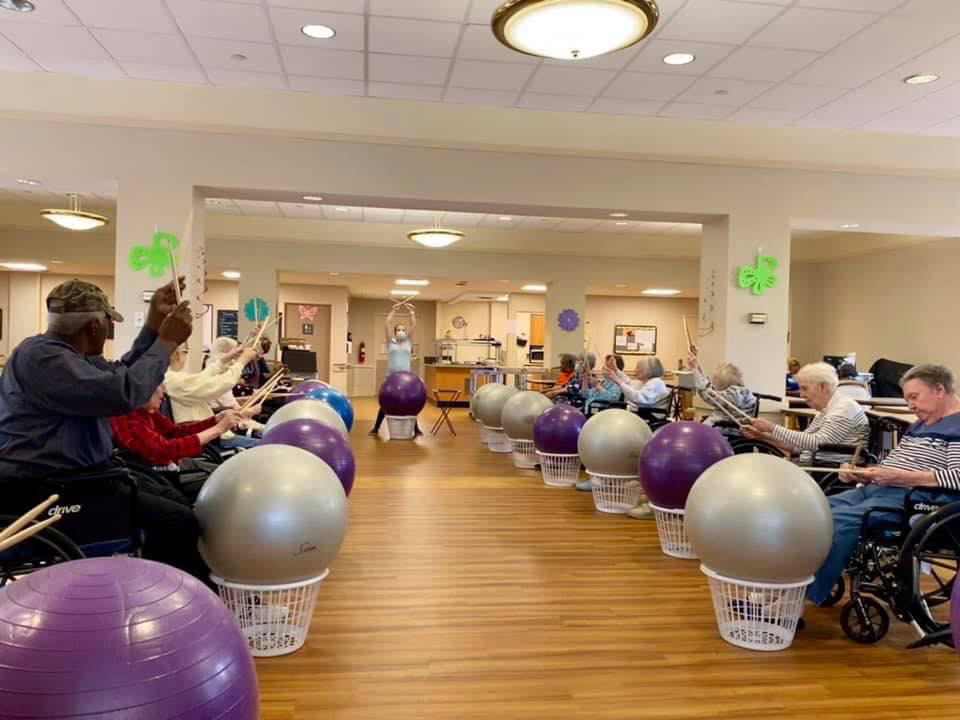In 2019, Laclede Groves, a Lutheran Senior Services (LSS) Life Plan Community located in Webster Groves, Missouri, established a music therapy program led by Emily Sitzes. Music therapy at Laclede Groves engages older adults in all levels of living through classes, one-on-one therapy, educational opportunities, singalongs, and much more. While music therapy sessions may look and sound like fun, the sessions are specially created and carefully planned to ensure participants benefit. Music therapy is used in many settings for people of all ages, but by applying it to residents Laclede Groves is providing older adults a unique opportunity.
Sitzes is a Board-Certified Music Therapist with a minor in Psychology, and she has clinical experience ranging from early childhood to end of life. She draws on all of this expertise to create purposeful music therapy sessions for older adults.
What is Music Therapy
Sitzes explains music therapy in this way: It’s clinical, scientific, and creative at same time; Music therapy uses music to create interventions with residents to accomplish individual goals in a therapeutic relationship.
Music therapists assess those they are working with and determine the best musical activity to achieve the goals of the individuals of group they are working with.
“While what I do looks like fun, and it is fun, residents receive lots of benefits from music therapy,” said Sitzes.
Benefits of Music Therapy for Seniors
Music therapy can be especially helpful for older adults. Well-planned music therapy sessions can help older adults increase or maintain their level of physical, mental, and social and emotional functions.
“Many times, people don’t realize the benefits,” said Sitzes. “There are lots of goals I have in mind when I’m planning sessions: Cognitive, communications, social, emotional, physical, and behavioral. I adjust based on who I’m working with that day.”
Increased Socialization
One of the main goals during music therapy in group settings is social interaction. Socializing is important to a person’s overall wellness. Group music therapy helps residents build social connections with fellow residents.
“It is never about me performing to a group, but instead it is about the group creating music together,” said Sitzes.
Group sessions often include singing, playing instruments, using body percussion, discussing songs, and more. These groups often prompt residents to reminisce and engage in conversation with each other.
Improved Speech Skills
Sitzes tells a story about a resident she was asked to work with was living with memory impairments and had lost the ability to speak clearly. Sitzes recalls how frustrated the resident would get because they had the thoughts but couldn’t communicate them. During their sessions, she and the resident would sing familiar tunes and the resident’s voice could be heard clearly down the hall. Their spouse said that after music therapy was the calmest and most communicative they were able to be.
“It’s amazing how music can affect people,” said Sitzes. “Music is processed in multiple parts of brain not just one. It’s connected to memory and movements, because music is in multiple spots in the brain it can override deficiencies in the speech part of the brain.”
Improved Cognitive Skills
Sitzes keeps her singalong sessions based in reality often using the season or upcoming holidays as inspiration. For example, around patriotic holidays she encourages residents to talk about their time in armed services or family or friends they have who have served in the military. After reminiscing, she’ll lead the group in patriotic songs.
“It’s about getting them involved with me,” said Sitzes.
Music can help a person remember lyrics, tunes, and even memories. So, the reminiscing part of Sitzes’s singalongs are especially important.
Music therapy can also help older adults continue to grow and learn. Sitzes works with a resident who is legally blind. The resident expressed the desire to find new ways to engage and grow. So, through therapeutic music education Sitzes is teaching this resident to play ukulele. She meets regularly with the resident and provides adapted lessons and the resident practices independently and sets goals for herself.
Physical Health Benefits
Music therapy can provide physical benefits too. Sitzes leads Music and Movement classes that work on range of motion, strength, and endurance.
“The goal is to maintain – keep using muscles and doing motions to keep the abilities we have,” said Sitzes. “Music is the motivator.”
Drums Alive is another music therapy class available at several LSS communities. Residents of all levels participate in this class and agree that it can be a workout. Drums Alive focuses on drumming along to familiar songs and using different movements.
Stress Reduction
Listening to or making music has been proven to reduce stress in people of all ages. Sitzes doesn’t limit music therapy to group sessions. She also does one-on-one sessions with residents. Sitzes received referrals from nursing staff, lifestyle enrichment staff, social services, and family members and caregivers. They typically refer residents with benefits in mind, such as decreased isolation, reduced stress, increased social interaction, and even management of pain and discomfort during the end-of-life journey.
“I often work with residents on depression or anxiety,” said Sitzes. “Music therapy is really good for emotional and spiritual support and self-expression.”
Music therapy, while fun, can benefit older adults in many ways – physically, emotionally, socially, and more. There are many activities and events offered in LSS communities to keep older adults engaged – music therapy activities are just one example! At LSS, you will find assisted living support in St. Louis and surrounding areas that have all the comforts of home and plenty of enrichment opportunities.


